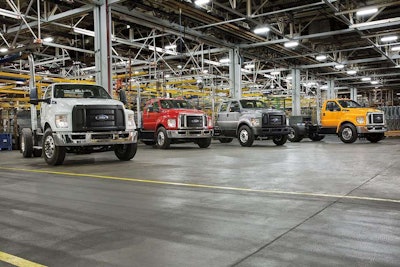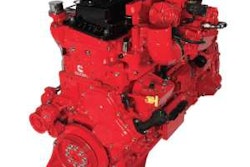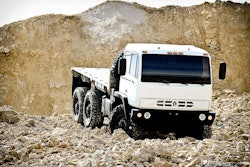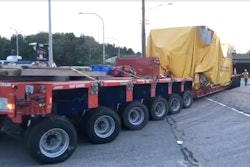 Ford trucks equipped with Landi Renzo CNG fuel systems.
Ford trucks equipped with Landi Renzo CNG fuel systems.Walking out from LAX to catch a cab, you can’t help but notice all the natural gas busses. It’s mandatory for these low emission producing vehicles to be there in place of their diesel counterparts.
In fact, government officials in the Golden State have been rallying for quite some time to reduce emissions in well-traveled highway corridors. They point to studies that have found that residents in these areas face greater health risks.
So, you would think that the future of natural gas vehicles is strong in the nation’s most populated state where infamous traffic jams and smog alerts are a part of daily life.
No, says natural gas giant Landi Renzo. The 60-plus year old Italian company, which produces alternative fuel systems—mostly compressed natural gas—for fleets around the world, says California is taking the natural gas vehicle industry for a ride.
While it’s no secret that low gasoline and diesel prices have diminished demand for natural gas vehicles, there’s another factor at work, according to Landi Renzo, that’s forcing the natural gas vehicle industry into the slow lane: costly certifications.
“I would like to reiterate the challenge with certification, especially for California,” Andrea Landi, president of Landi Renzo USA, told Hard Working Trucks. “It’s getting impossible to sustain certain costs and a state like California—we know that other states follow the California requirements, the California Air Resources Board requirements.
“So we’re not only talking about California, but other states. And so the cost of certification is getting more and more expensive. The risk for California is to lose natural gas trucks—that’s a fact. It’s very, very challenging—very difficult for us to continue certifying platforms for California.”
Landi says the technical exercise for certification is not an issue.
“These labs are getting more and more expensive because California is only recognizing just a handful (of labs). Sometimes you can’t even go to the lab because California is not recognizing any additional laboratories. So it’s really getting complicated. And the only result here is more and more polluting trucks on the road and this is not good.”
Certifications cost millions, Landi said, which adds to the price of natural gas vehicles.
Some factors are helping to make natural gas a more attractive choice for fleets: increased negative publicity surrounding diesel engine technology, the improved emissions that natural gas engines offer and the growing renewable natural gas sector.
Landi Renzo Group Global CEO Cristiano Musi told Hard Working Trucks that he was encouraged during his visit at ACT Expo in Long Beach this past May. He said he knows the demand for natural gas in the Golden State is there—particularly for medium and heavy-duty trucks.
Of particular interest is renewable natural gas. The notion of creating a sustainable fuel source from trash and agricultural waste—also known as biomethane—is catching on, particularly with Landi Renzo, which takes the well-to-wheel concept very seriously. Safe, a subsidiary of Landi Renzo, develops components, such as compressors, for natural gas fueling stations.
“I think this is a very interesting solution because even in terms of emissions, if you look at CO2 and NOX levels of renewable natural gas, from well to wheel, you see that the impact is very similar or sometimes even better when compared to one of the electric vehicles,” Musi said.
Musi brought up a very important point when he said, “when compared to electric vehicles.”
Electric vehicles, led by industry dynamos like Tesla CEO Elon Musk, are creating a lot of buzz, even though their capability in terms of range and payload capacity, diminished by battery weight, is still sorely lacking when compared to natural gas engines.
Coalition for Renewable Natural Gas founder and CEO Johannes Escudero reminded an ACT Expo audience in May of the tough competition posed by vehicle electrification proponents.
“We need all the help we can get. There’s a strong bias towards electrification of the transportation sector,” Escudero said during Game Changer Summit 2.0. “That’s where much of the state and federal funding is going to these days and I think some of that will change. We’re working hard to mitigate some of that but we need everybody’s support.”
Escudero’s comments were met with applause. (An RNG jobs report posted at rngcoalition.com states that California stands to gain 130,000 jobs and generate $14 billion by using renewable natural gas in trucks).
In its latest report, the International Energy Agency reported that the U.S. will become the largest natural gas exporter by the year 2022, beating out Qatar and Australia. About half of that natural gas is expected to be converted to liquefied natural gas (LNG) prior to export. The U.S. is the world’s largest producer of natural gas.
Last week, Fox News political commentator Sean Hannity, an outspoken conservative, endorsed natural gas on his radio program as a means of creating jobs, lowering emissions and ending dependence on foreign oil. Democrat support for natural gas has waned in recent years.
“Therein lies the lifeblood of America’s economy and with it lower energy prices for businesses so that we can be more competitive and therein lies with it millions of high-paying career jobs for Americans,” Hannity said. “And therein lies huge national security benefits because we don’t need the Middle East for anymore oil or anymore energy. And we’re not beholden to what the Saudis and these Middle Eastern countries are doing as they manipulate the price of a barrel of oil. And we can make the transformation to cleaner burning natural gas because we are the Saudi Arabia—we are the Middle East of natural gas. And we have hundreds and hundreds of years of supply. So therein is America’s future and the benefits are so multi-layered it’s ridiculous.”
Landi said the State of California has not attempted to justify the high cost of natural gas certifications.
“They could allow a simpler regulation for aftermarket conversions of vehicles like ECE R115 in Europe. In addition more labs should be accredited, that way the cost of testings will be lower,” he said.












